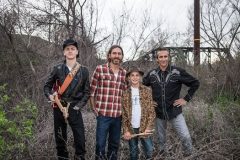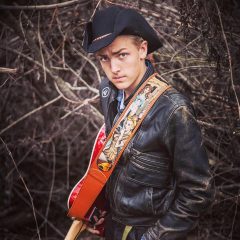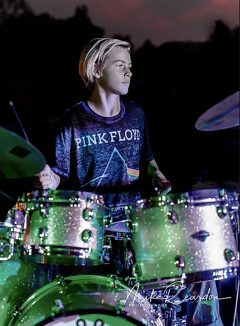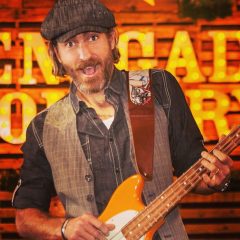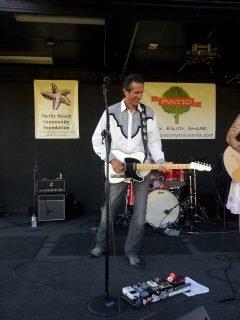Featured Stories
THE SEA MONKS: Ameripolitan Music, Family Style
The first thing that you notice about the Sea Monks is that the local San Diego band has a couple of very young band members—a tall and angular 17-year-old lead guitarist and a tousle-headed drummer, who’s just 14.
The second thing you learn is that the Sea Monks, based in Clairemont, are a family affair. Baseball-capped Jason Kapchinske is the bass player and dad, while mom Pam Kapchinske did the artwork for the band’s first CD release, Gasoline. (Their second CD will be released this year.)
Grandparents Steve and April Kapchinske, and Pam’s mother, Doris Wiley, also support the band as audience members at many shows. Jeff Houck, the band’s secret weapon, is the second lead guitarist, known to the boys as “Uncle Jeff.” He’s not a Kapchinske, but he’s certainly part of the family.
Named for a strange sea creature from Polish legend, the Sea Monks offer a solid mix of guitar+bass+ drums rockabilly, country rock, and blues. The Sea Monks call their music “Ameripolitan.”
Frontman Noah Kapchinske, the man on the “coincaster,” says that Ameripolitan is a term coined by Dale Watson (a guitarist and songwriter based in Austin, Texas), referring to original music with a prominent roots influence—specifically honkytonk, outlaw, rockabilly, and/or western swing. “He started the genre as a way to differentiate ‘real country music’ from the twangy commercial pop that corporate Nashville calls country today. I typically call the Sea Monks’ style Ameripolitan or renegade funkabilly.”
Noah says that he was first turned on to Dale Watson’s music in fourth grade by his father’s high school friend, Cullen Titmas.
“He knew I was a huge Johnny Cash fan, so when he caught Dale’s set one night, he told me to check him out,” Noah said. “I became a huge fan right away. Dale has been a huge inspiration and a major influence on my development as a musician, songwriter, and performer.”
Two years ago, Noah had the opportunity to open for Ruby Dee and the Snakehandlers, a rockabilly band from Austin.
“They dug what we were doing, so they invited us to open for them at Continental Club, a notorious little honkytonk where Dale Watson plays almost weekly,” Noah said. “It was through this very fortunate connection that I’ve been able to play a few gigs, opening for heroes of mine like Dale and Rosie Flores. I’ve even had the huge honor of sitting in with their bands!”
Watson’s influence on Noah is immediately noticeable. “Dale’s iconic tele is covered in European coins, so when I glued coins to my own axe, I did it as a salute to him, Rosie, and all of the other honkytonk heroes that are keeping Ameripolitan music going strong,” Noah said.
Noah Kapchinske’s guitar teacher is Robin Henkel, a San Diego blues and jazz star, who says, “About six years ago Noah’s father, Jason, asked if I would take his son as a student. Am I allowed to be honest? After 40-plus years of teaching and playing professionally, I admit to having become rather jaded and calloused about teaching people who are not ready to do the work. If they play in a band, or practice a lot, write their own songs, and are highly motivated, I will be a great teacher. Otherwise, no dice! My standard line for parents is something like ‘I’m not that great with kids; there are plenty of teachers who are.’ It’s an intentional response to shield myself from students who are not ready to do the work.”
That might have been the end of it, but as time went on, Henkel continued to see Jason at some of his shows.
“We had gotten to know each other a little, and when the topic of lessons came up again I said, ‘Sure, let’s give it a try.’ As it turned out, now I am glad and honored to have been given the opportunity to have influenced Noah’s musical growth. He and his dad, Jason, still come by my pad every Monday. Since Jason plays bass in the Sea Monks, I’ll spend some time working with Noah and then get dad on the bass. I’ll play brushes on the snare drum so Noah and Jason get to apply whatever guitar riff and bass part we did that day. Currently, Noah has been interested in finger picking. Noah digs the rockabilly thing, which is not my forte, but Noah can take the blues, jazz, and theory that I show him and integrate it quite nicely into his own way of playing. Some of the phrases I’ve taught him have shown up in the Sea Monks repertoire. It makes me feel like a proud daddy.”
For a long time, Henkel had been privately thinking that it would be good to get Buzz Campbell (guitarist for Hot Rod Lincoln, Lee Rocker, and others) to show up at a lesson so that Noah could learn and talk about music with a fellow who is seriously accomplished in the rockabilly style.
“That meeting actually took place about six months ago,” Henkel explained. “Noah’s younger brother Kai was there as well, and near the end of our session they played a song for Buzz. When they started playing, Buzz’s eyes opened wide and he got a big smile on his face. You could tell he was impressed and digging it. Once again my heart glowed like a proud daddy. One of Noah’s strengths is his level of maturity. Even when he started lessons in his early teens, I noticed and was impressed that he had an ability to focus his attention on what I was saying, understand, and ask the good questions. It’s a quality I find hard to describe. He seemed to be able to communicate with adults comfortably and with a poise that many kids seem to lack [adults included]. I have always attributed it to good parenting. My hat is off to their entire family.”
“The Sea Monks like to cover songs that are less widely recognized, sometimes even totally obscure,” Noah said. “Of course, we have a handful of honkytonk standards in our repertoire, but we generally try to avoid anything too cliché. Our covers are often very different from the original renditions, and I think that this kind of sets us apart from a lot of other bands in our field. For example, when we started covering ‘The Mama Tokus Theme’ by local delta blues legend Robin Henkel, we pretty much turned it into a outlaw-disco song in the vein of someone like Sam Morrow or Paul Cauthen. Once, we even turned a pop song by Billie Eilish into an outlaw country song for the hell of it. Most bands aren’t doing stuff like that, and it’s helping to get us noticed on the local scene. We’re also working on a ton of new original material to add to our set. We have several of these new tunes in rotation already, and we have a bunch more to come as we work towards our sophomore release.”
Noah said that he’s just recently started to get into the cow punk sound. “The Farmers are a huge inspiration and I really love the way their music sounds. Obviously the Sea Monks is a much younger band, so we’re not as tight and experienced as they are, but I do think that we have a lot of the same influences and therefore a somewhat similar sound. We both play roots-based music with a bluesy grit, a country twang, and a punk edge.”
For as young as he is, Noah certainly has a deep knowledge and love for all kinds of music.
“I’m definitely inspired by artists like Buddy Guy, who are keeping real roots music alive,” Noah said. “That’s really what drew me to artists like Dale and Rosie—they’re more on the honkytonk/rockabilly side of things, of course, but the preservationist mentality is essentially the same. I have so much respect for what Dale did in founding the Ameripolitan community. He has created a platform for artists and fans to find and support musicians who are keeping the sound alive. All of these musicians (the Farmers, too) have a certain respect for the history of American music that has certainly influenced me and has informed my own music career so far.”
The kid on the skins, drummer Kai Kapchinske, at the back of the stage, holding down the backbeat, is in 8th grade and plays in his school’s jazz band. Outside of school, his drum teachers are Dave Butterfield (of the Stopper Group and the Routine) and Toby Ahrens.
“For such a young drummer, Kai has really good time and plays within the framework of the music,” said Ahrens. “Kai seems to really understand that groove is more important than flash. I think he will naturally improve as he gets older because he practices and studies and seeks out new music. I also think that he is at the beginning stages of developing touch and tone on the drums.”
Could he be the next Charlie Watts?
“Ha ha! He will develop his own unique style,” Ahrens said.
For a 14 year old, Kai is on the knife edge between childhood and adolescence, ranging from kid-cute to amazingly mature from moment to moment.
“I set up my kit, get a Coke and get ready to play,” he said. “I don’t really get stage fright; sometimes I feel like I’m supposed to, but my drumming comes very naturally. I usually black out the crowd.”
At one gig, a spectator put on her own show.
“A drunk lady fell into our tips one time,” Kai said. “It’s about self-control.”
I first met the Sea Monks at 2019’s Gator by the Bay, the four-day Louisiana-themed music and food festival held each year around the second weekend in May. Presented by San Diego’s Bon Temps Social Club, it’s live music with more than 100 musical acts, all happening at Spanish Landing Park. Unfortunately, the Sea Monks were rained out, and I didn’t get a chance to hear them play. But they came highly recommended by Corbin Turner of the Farmers (formerly the Beat Farmers), so I knew that I wanted to hear them play. I first saw them play about a month later, when they played a few songs between Farmers’ sets at the Downtown Café in El Cajon. That’s when their music caught my attention and wouldn’t let go. Initially, it was interesting that two of the band members were so young, but it was their sound and obvious love for what they were doing that kept me following them. The song I particularly remember from that evening was their smorgasbord medley ‘Brand New Cadillac,’ a Clash song in which they expertly squeezed in instrumental bits of ‘Miserlou,’ ‘Secret Agent Man,’ ‘Wipe Out,’ ‘Mary Had a Little Lamb,’ the Batman theme, ‘The Lion Sleeps Tonight,’ the Peter Gunn theme, ‘Live and Let Die,’ ‘Ghost Riders in the Sky,’ ‘Smoke on the Water,’ ‘Caravan,’ ‘Space Truckin,’ and ‘Highway Star’. The dance floor in front of the stage was packed.
The second time I saw the Sea Monks was at the Helix Brewing Company, where I first met and spoke to Steve and April Kapchinske. April told me that the band had a fourth member, Jeff Houck, adding that Noah had invited him to join the band for ‘texture,’ though I am not sure I know what that means.
It wasn’t until my third Sea Monks show, at Queen Bee’s Art and Cultural Center in North Park, that I first heard and met Jeff.
On the “Sparklecaster,” “Uncle” Jeff Houck joined the band in 2018, adding a rocking layer of country twang with his sparkly B-bender guitar. Jeff played with the hard-rocking New England band August in the 1980s and now regularly plays with the Sara Petite Band and the Sickstring Outlaws. Houck (pronounced Howk) worked for Taylor guitars as an engineer, and he met the Sea Monks during their first recording project.
“I was speaking at a North Park Music symposium they attended about recording and they must have liked what they heard,” Houck said with a grin. “Noah asked me to join the band about a year ago and I was really honored to be asked. I brought in advice and experience and my musical expertise.”
“He’s the real deal, and the Sea Monks couldn’t be happier about making music with him,” said Noah.
When he has a night off, he’s happy to play with the Sea Monks.
Houck comes from a musical family and was in third grade when his mother told him to pick an instrument.
“I chose a guitar,” Houck said. “My Uncle Albert was a premier accordion player during WWII. Someone heard him playing in the barracks and word moved up the chain of command. He ended up playing in Eisenhower’s touring band.”
Houck grew up in Boston in the late 1960s and took lessons at a local music store, where he played classical guitar with nylon strings.
“In sixth or seventh grade, we’d sneak into high schools and see Aerosmith,” Houck said.” It was my transition to the ‘dark side’—it was electric guitar playing full-time after that. Now it’s the enjoyment of the unknown—to still play actively in two or three different bands and try not to phone it in.”
Unlike many of his peers who only focused on music (“lots of guys who didn’t pursue an education were living in their parent’s basements”), Houck continued his non-musical studies past high school. “I always had a dual path, manufacturing and production work, but music was never a hobby. At this point in my life, why do I keep doing it? It’s my passion. I’ll have a gig at the Swallows Inn in San Juan Capistrano, a long gig, and I’ll get home by 3 a.m., all for $100. The goal is to be better this weekend than I was last weekend. My parents were smart enough to keep me involved in music. I have perspective on it now. If you told me at 20 that I’d be playing with the Sea Monks at 61, I’d never have believed it.”
What are Noah’s strengths as a guitarist?
“His musical knowledge… he plays gypsy jazz in his high school; he has a depth of knowledge and formal training,” Houck said. “He’s a sponge—he’ll steal my lick, add to it, and make it better. He’s an old soul and a super human being.”
How are Jason and Kai as a rhythm section?
“Kai is pretty impressive and he keeps getting better and better. Maintaining tempo is the toughest thing… that’s probably Kai’s biggest improvement in the past year,” Houck said. “He and Jason will use a metronome and practice together. In a professional band, the tempo has to be steady. The Sea Monks are focused on it and appreciate it, because they want to improve. Usually, Noah starts a song with a count, not Kai. As a drummer, you need to count off some songs and your brain is setting that tempo. The drummer starts it off to get the tempo going before the song hits the ground.”
Houck was there when the Sea Monks opened up for Dale Watson.
“Watson had the boys come up on stage together. Kai sat down in Dale’s band and played two songs; you would have thought it was Dale’s drummer. Noah was prepared when Dale handed him his guitar, and he tore into ‘La Grange’ and ‘Working Man Blues.’ It’s as good as it gets. They continue to learn and to improve, and I want to be as good with the band as I can. They’re not a ‘kid band,’ they’re super-talented young musicians. The band has to stand on the merits and importance. Kai really bites into it—he’s a really talented musician, not just a kid. I can see the joy in making music that Kai and Noah have with the Sea Monks.”
Dad and bassist Jason Kapchinske was enlisted into the band a few years ago when his two boys asked their father to join them. An environmental specialist for SDG&E, Jason had taken classical violin lessons as a child, and played in the high school orchestra. “I let it go after high school and didn’t play for years,” Jason said. “In my 30s I started enjoying listening to bluegrass, and I took some mandolin lessons, but I was only a mediocre mandolin player. The boys started playing guitar and drums in the garage together, and one day they asked me if I would buy a bass and be their bass player. At first I almost said no because I was intimidated, but I sure am glad I said yes! What a gift they’ve given me!”
Obviously, the boys have also benefited from their dad’s love for music.
“There was always music on the stereo around the house when Noah was little, and I sang to him every night. We also went to lots of bluegrass festivals,” Jason added. ”When Noah was six years old, I told him I would pay for him to take music lessons if he wanted to pick an instrument, and he picked guitar. Our agreement was that he would practice at least 20 minutes a day if we were going to pay for lessons, and he liked it enough from the beginning, so it was never too hard to get him to practice. He first took lessons at Nightingale Music in Bird Rock [which is a really great place for little kids to get turned on to music] and then started taking lessons from Robin Henkel when he was about seven or eight. They share a really neat friendship now.”
Noah will graduate from Mission Bay High School in June of this year, where he currently studies jazz under instructor Jean Paul Balmat. In 2019, the ensemble went to Japan, and, in 2020, they’ll visit Cuba and New Orleans.
I asked Balmat about Noah’s love for Americana music and his studies in jazz.
“Noah’s rockabilly is based in the blues and jazz; there’s a huge connection to rockabilly and rock ‘n’ roll,” Balmat said. “We are a New Orleans-style jazz band, so blues is a big part of that style. Noah is an amazing addition to the band; I’ve formatted some of our songs to fit his style. We do some Dr. John arrangements. The music needs to be soulful, and Noah has that in his playing and on his face when he’s playing. Noah has a maturity beyond his years. He was like that at 14; he’s an old soul. He was punked out with a Mohawk and a studded belt—he was a complete character. He’s a great kid and I’m happy to sing his praises.”
The last time I saw the Sea Monks was in early December at Nate’s Garden Grill in City Heights. Mom Pam and grandparents Steve and April were there, and as all of the band members are warm, friendly, and funny: “Hang on, I’m fiddling with my G-string,” Jason says at one point during the show—and you quickly feel that you’ve been welcomed to both the Kapchinske and Sea Monks family, the Ameripolitan music family.
Catch the Sea Monks this month at these shows: Saturday, February 1, Helix Brewing Co., 8101 Commercial St., La Mesa, 6:30pm.
Sunday, February 9, Wonderland Patio, 5083 Santa Monica Ave., OB, 10:30am.
Saturday, February 15, Grand Ole BBQ, 15505 Olde Hwy. 80, El Cajon, 1pm.
Saturday, February 29, Nate’s Garden Grill, 3120 Euclid Ave., San Diego, 6pm.










